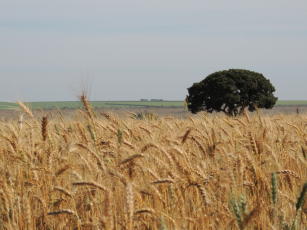Plant communicates with beneficial microbes to drive pathogens away
Plant communicates with beneficial microbes to drive pathogens away
Wheat plants “communicate” with beneficial microrganisms that involve their roots to have access more nutrients in the soil and obtain higher protection against fungal diseases. Researchers from Embrapa Environment (Jaguariúna, SP) and Esalq/USP (Piracicaba, SP) found that in experiments led throughout 2021 with funding from the São Paulo State Research Support Foundation (Fapesp).
Searching for more sustainable management, the researchers have devised new experiments to understand patterns and relationships that are established between such microbiome, the soil, and eventually inoculated beneficial bacteria.
As the rhizosphere microbiome provides ecological services to the host that include nutrition and protection against diseases, scientists aimed to discover if wheat plants could change their standard root exudation to access the resources supplied by antagonistic microorganisms, against infection by a pathogen transmitted by the soil, the fungus Bipolaris sorokiniana.
For that purpose, they tested the impact of three beneficial bacteria - Streptomyces, Paenibacillus and Pseudomonas, which are antagonistic to the pathogen, at the beginning of the disease, to understand how the beneficial host plant and beneficial microbes communicate to drive the pathogen away from the rhizosphere.
“We tested the independent inoculation of the three bacterial isolates in wheat seeds inoculated and not inoculated with the pathogenic fungus. The severity index was highest (93%) in plants inoculated exclusively with the pathogen (control treatment). In plants inoculated with the antagonistic bacteria and the pathogen, the severity index varied from 50 to 62%, showing a significant reduction in the incidence of the disease in comparison with the control treatment, explains Helio Quevedo, from the University of São Paulo's Luiz de Queiroz College of Agriculture (Esalq/USP).
“We have used the bacterial isolation of the rhizosphere, followed by an in vitro triage. The selected inoculants can solubilizar phosphorus, to fix nitrogen and produce indoleacetic acid”, the scientist says.
Impact of microbial diversity in plant protection
In another study, the scientists aimed to assess the diversity in the rhizosphere microbiome and its impact in the protection of the wheat plant inoculated with the root pathogen Bipolaris sorokiniana and with an antagonistic bacterial inoculant - Pseudomonas. With a technique called “dilution to extinction”, the researchers “diluted” the microbial diversity of a natural soil, and used treatments with a diluted and autoclaved soil gradient.
Inoculation with Pseudomonas resulted in higher plant height and dry root mass, especially in treatments with natural soil for the height, which shows the inoculant's potential to promote growth. This inoculant also promoted plant protection in the treatments where the pathogen was introduced.
The Embrapa Environment researcher Rodrigo Mendes explains that the rhizosphere microbiome offers the host plant beneficial functions, including nutrient absorption, tolerance to abiotic stress, and defense against soil-borne diseases. For example, when the fungal pathogen invades the root system, specific bacterial families with certain functions are enriched in the rhizosphere and help to prevent the plants from getting infected by the pathogen.
According to Esalq's Caroline Nishisaka, the disease severity index was higher in all the treatments that received the pathogenic fungus Bipolaris sorokiniana, especially the more “diluted” soil, showing that it is more destructive in soils with low microbial diversity, where the antagonistic inoculant is also more efficient for plant protection.
The next step will be to analyze the impact of the invasion of fungi and beneficial bacteria in the composition of bacterial and fungal communities in the rhizosphere to understand the patterns and correlations between the structure of rhizosphere's microbiome, and the soil, microbiome diversity, and the establishment of the beneficial inoculant.
The studies were presented at the III International Symposium “Avances en el mundo de Microbiomas" [Advances in the world of Microbiomes], at the University of San Francisco de Quito, in October 2021. The research project coordinated by Rodrigo Mendes, is funded by Fapesp, through regular aid (Fapesp process 2020/00469-2) and a PhD scholarship granted to Caroline Nishisaka.
Cristina Tordin (MTb 28.499/SP)
Embrapa Environment
Press inquiries
meio-ambiente.imprensa@embrapa.br
Phone number: 19-99262-6751
Translation: Mariana Medeiros (13044/DF)
General Secretariat
Further information on the topic
Citizen Attention Service (SAC)
www.embrapa.br/contact-us/sac/


